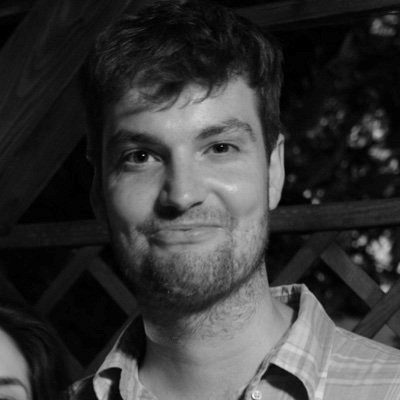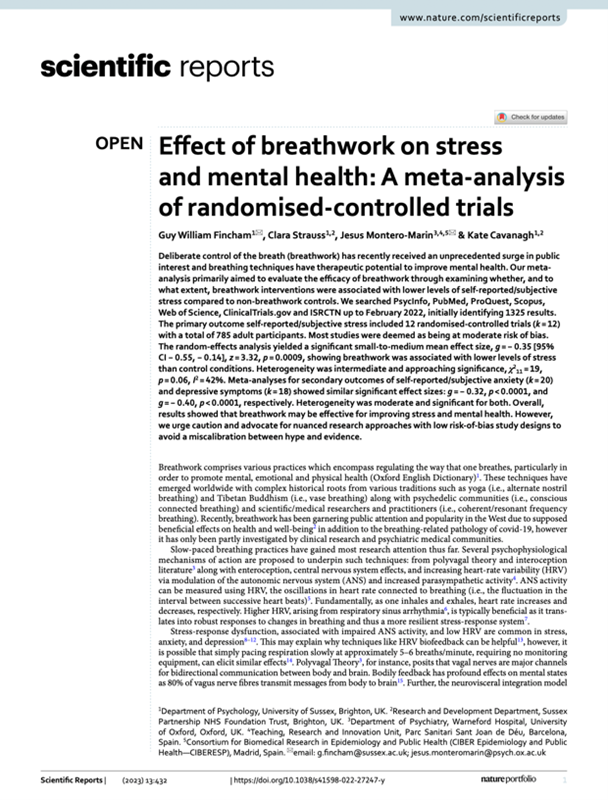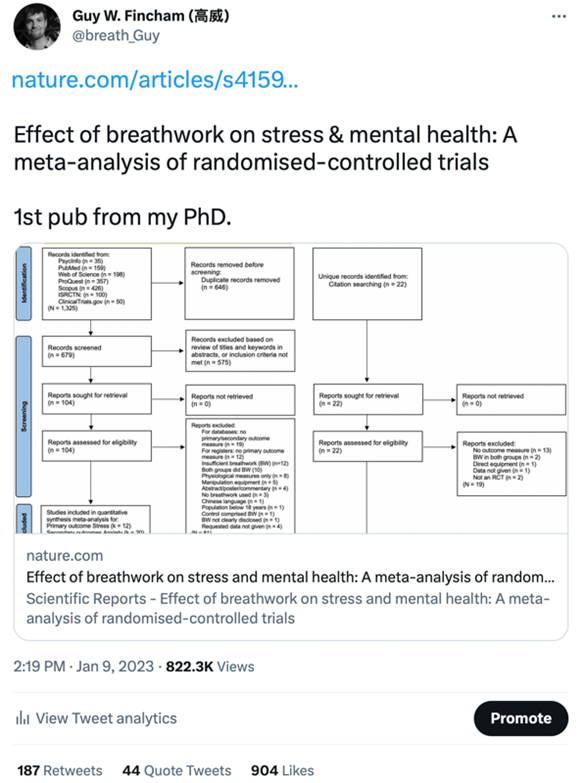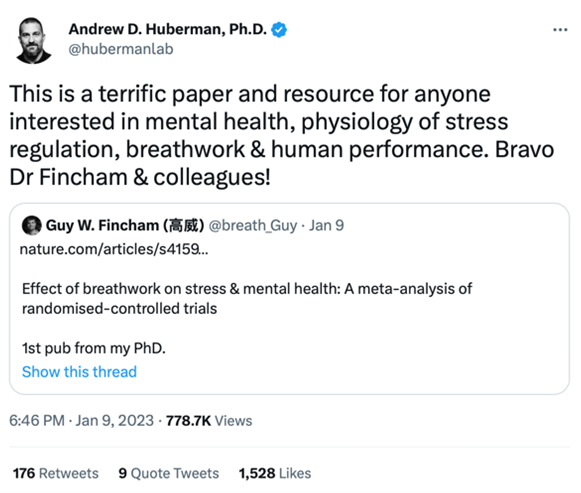Voices from the Sylff Community
A 2021 Sylff fellow, Guy Fincham is a researcher and teacher of breathwork. While interest in breathing techniques has surged, Fincham cautions that there may be a mismatch between hype and evidence. He thus conducted a meta-analysis examining the effect of breathwork on stress, anxiety, and depression and hopes that the preliminary evidence paves the way for further research. Fincham also discusses the “Train over Plane” travel fund that he used to attend a conference in the Netherlands.
* * *
Recent Publication
I am very pleased to share that the first paper from my PhD work (wholly funded by Sylff) has been published in the Nature Portfolio journal Scientific Reports. The paper is titled “Effect of Breathwork on Stress and Mental Health: A Meta-Analysis of Randomised-Controlled Trials” (nature.com/articles/s41598-022-27247-y).
Our meta-analysis on breathwork and mental health has received huge public interest so far, with nearly one million views of my tweet sharing it! According to Almetric, a platform that measures the attention that research outputs receive, our paper has done particularly well among the over 23 million research outputs across all sources that it has tracked to date, placing in the 99th percentile. In other words, it is in the top 5% of all research outputs ever tracked by Altmetric. Dr. Andrew D. Huberman, professor of neurobiology at Stanford School of Medicine and an inspiration of mine, even congratulated us on our work, though I had to reply saying that I am not a doctor just yet (currently being in my second year)!
Breathwork has received an unprecedented surge in public interest, and breathing practices may improve mental health. Breathwork techniques have emerged worldwide with complex historical roots from various traditions including, but certainly not limited to, Hinduism (Yoga and pranayama—where prana means “vital energy” or “life force” and ayama means “regulation” or “control”), Buddhism, Sufism, Shamanism, and psychedelic communities, along with scientific and medical researchers and practitioners.
More accessible approaches are needed to reduce or build resilience to stress worldwide, made even more evident by the COVID-19 pandemic. But while breathwork has become increasingly popular in the West owing to its therapeutic potential, there also remains the possibility of a mismatch between hype and evidence.
Accordingly, we examined whether breathwork interventions were associated with lower levels of self‐reported or subjective stress (classed as our primary outcome) and anxiety and depression (classed as secondary outcomes) compared to non-breathwork control groups. We searched seven databases, including two trial registers. The primary outcome of subjective stress included 12 randomized‐controlled trials (RCTs). Most studies were deemed to be at moderate risk of bias. The secondary outcomes of subjective anxiety and depressive symptoms comprised 20 and 18 RCTs, respectively.
The meta-analyses yielded significant small to medium mean effect sizes, showing that breathwork was associated with lower levels of subjective stress, anxiety, and depression than non-breathwork control groups. Our results thus showed that breathwork may have efficacy for improving stress and mental health. We urge caution, however, and advocate for nuanced research approaches with low risk‐of‐bias study designs to avoid a miscalibration between hype and evidence.
A key limitation of our meta-analysis was that, given the small sample size—likely due to the relative recency of the phenomenon of breathwork in the West—paired with a moderate risk of bias across included RCTs, the results should be interpreted very cautiously and not be extrapolated. Breathwork may help some but not others.
Nonetheless, breathwork could at least be part of the solution to meeting the need for more accessible therapeutic behavioral approaches to improving mental health. But again, more robust, well-designed studies are now needed to ensure that such recommendations are grounded in research evidence.
Public interest in and research on meditation has surged over recent decades. We may be at a similar cusp with breathwork and anticipate considerable growth in the field. Given the close ties of breathwork to psychedelic research, this could further accelerate growth. The scientific research community can build on the preliminary evidence provided here and thus potentially pave the way for effective integration of breathwork into public health.
The vast majority of my time spent as a first-year PhD candidate was devoted to this research project. I would like to thank my colleagues and collaborators at the University of Sussex and University of Oxford, along with the editor and reviewers at Scientific Reports for improving our work. Lastly, this research would not have been possible if it was not for the Sylff Association. I hope that this is only the beginning.
I am launching some of my own empirical breathwork studies soon with the Psychology and Medical Schools here at Sussex and with the University of California San Francisco (UCSF). I am also writing a physiologically oriented review with the Brighton and Sussex Medical School, and I am a co-investigator on The Breathwork Survey, launched by the Centre for Psychedelic Research at Imperial College London.
Train over Plane, Psychedelic Breathwork, and ICPR 2022
In late 2022 I traveled to Amsterdam and Haarlem in the Netherlands for ICPR 2022 (Interdisciplinary Conference on Psychedelic Research), primarily for a workshop the day before on breathwork, my research focus (Breathwork as Psychedelic Therapy).
As part of its green commitment, the University of Sussex School of Psychology has launched a new “Train over Plane” travel fund, which supports travel to conferences by train instead of plane. As a doctoral researcher I was fortunately one of the first to try it out, so I share my thoughts below on my experience with the trip I made to the Netherlands.
I had a profound experience that I could never have imagined or expected from breathwork (and so much more). I have undergone a personal paradigm shift and have gained an newfound respect for the therapeutic potential of breathwork as and for psychedelic therapy. The experience was invaluable and has made me view psychedelic breathwork under a new lens, which will benefit my future research and work.
Moreover, I connected with researchers and clinicians, some of whom were very interested in The Breathwork Survey that I am working on with the Psychedelic Research Group at Imperial College London. I had a lot of fun and had some lovely down regulation time the day after it had all finished.
I wanted to use the Train over Plane fund because train is my favorite form of transport by far and is fortunately more eco-friendly than flying, saving up to 90% in carbon emissions. I had never been on Eurostar before so was glad to find out that it travels to Amsterdam. For the first journey I changed trains at Brussels, and the return leg was direct. Another great thing is that trains between Brighton and London St. Pancras International are direct.
Although the journeys took around two working days (one there and one back), I particularly enjoyed the comfort of traveling by train compared with flying, feeling much less restricted and freer. I also made friends with a lecturer at Kings College London on their way to a conference in Utrecht. I would encourage everyone at the Sussex School of Psychology to use the Train over Plane fund if traveling within the UK or mainland Europe.
I am now looking forward to ICPR 2024 . Hopefully there will be some research being presented on breathwork next time (my meta-analysis)! I would like to thank the Open Foundation and Open Up for organizing the ICPR conference and (breath)workshop, respectively; Sylff once again for funding me and making all this possible; my supervisors Kate Cavanagh and Clara Strauss for giving me their advice; Charlotte Rae and Harry Lewis for setting up the Train over Plane fund; and Mitzi Tahsin and Fran Barnard for assisting me when booking through the Key Travel platform.
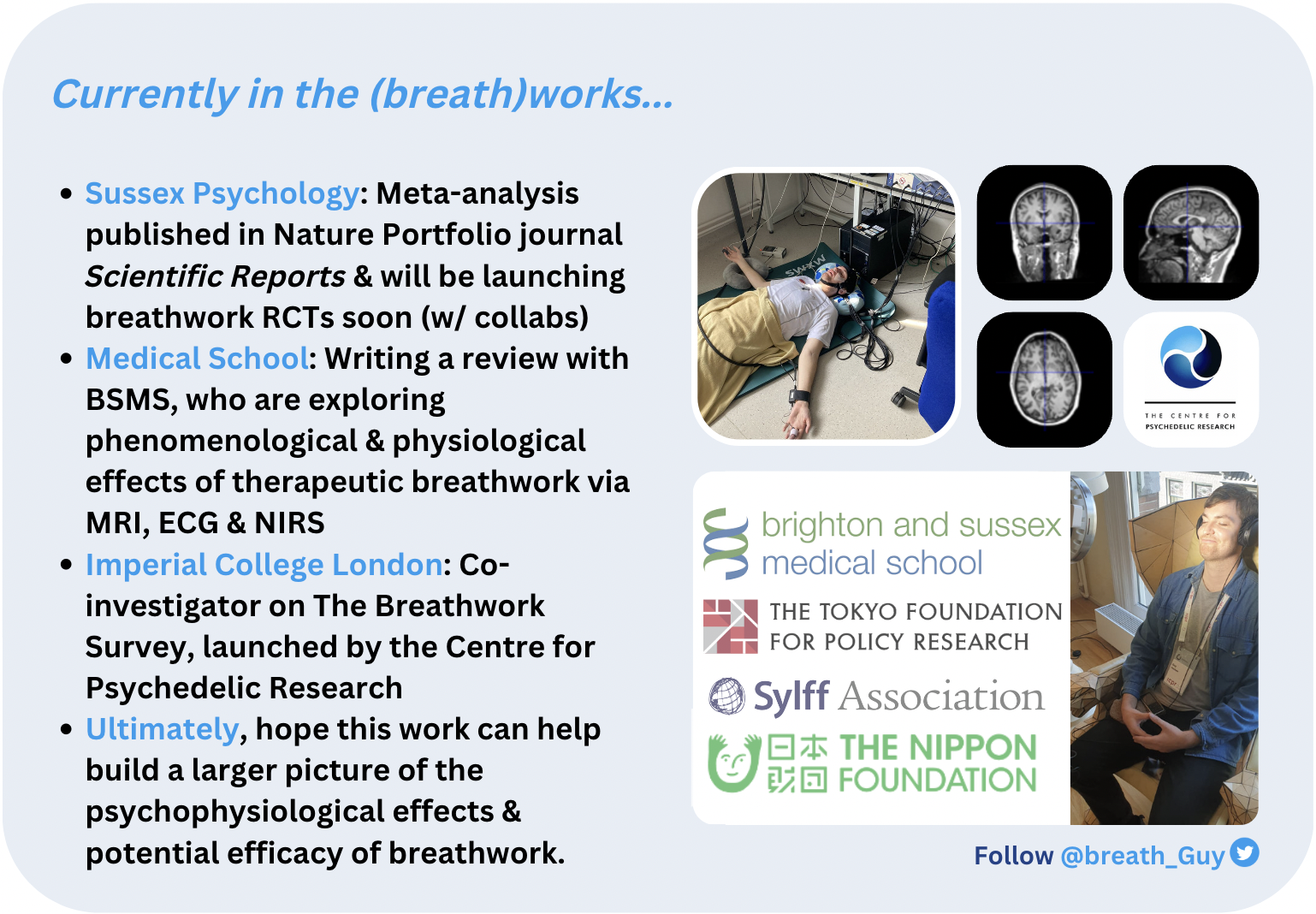
Yes, that is me in the photos here (including my brain while doing breathwork in the MRI scanner at Sussex)!
Most importantly, thank YOU for reading (and breathing)!
